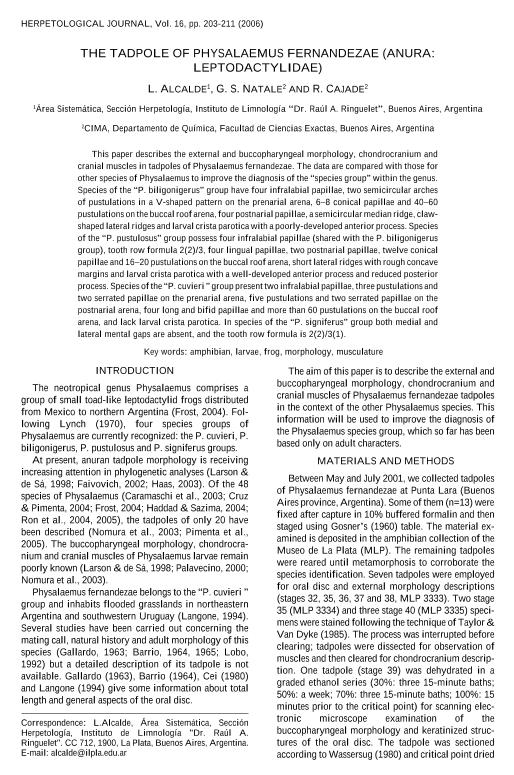Mostrar el registro sencillo del ítem
dc.contributor.author
Alcalde, Leandro

dc.contributor.author
Natale, Guillermo Sebastian

dc.contributor.author
Cajade, Rodrigo

dc.date.available
2017-10-06T20:32:17Z
dc.date.issued
2006-12
dc.identifier.citation
Alcalde, Leandro; Natale, Guillermo Sebastian; Cajade, Rodrigo; The tadpole of Physalaemus fernandezae (Anura: Leptodactylidae); British Herpetological Society; Herpetological Journal; 16; 12-2006; 203-211
dc.identifier.issn
0268-0130
dc.identifier.uri
http://hdl.handle.net/11336/26182
dc.description.abstract
This paper describes the external and buccopharyngeal morphology, chondrocranium and cranial muscles in tadpoles of Physalaemus fernandezae. The data are compared with those for other species of Physalaemus to improve the diagnosis of the “species group” within the genus. Species of the “P. biligonigerus” group have four infralabial papillae, two semicircular arches of pustulations in a V-shaped pattern on the prenarial arena, 6–8 conical papillae and 40–60 pustulations on the buccal roof arena, four postnarial papillae, a semicircular median ridge, clawshaped lateral ridges and larval crista parotica with a poorly-developed anterior process. Species of the “P. pustulosus” group possess four infralabial papillae (shared with the P. biligonigerus group), tooth row formula 2(2)/3, four lingual papillae, two postnarial papillae, twelve conical papillae and 16–20 pustulations on the buccal roof arena, short lateral ridges with rough concave margins and larval crista parotica with a well-developed anterior process and reduced posterior process. Species of the “P. cuvieri ” group present two infralabial papillae, three pustulations and two serrated papillae on the prenarial arena, five pustulations and two serrated papillae on the postnarial arena, four long and bifid papillae and more than 60 pustulations on the buccal roof arena, and lack larval crista parotica. In species of the “P. signiferus” group both medial and lateral mental gaps are absent, and the tooth row formula is 2(2)/3(1).
dc.format
application/pdf
dc.language.iso
eng
dc.publisher
British Herpetological Society

dc.rights
info:eu-repo/semantics/openAccess
dc.rights.uri
https://creativecommons.org/licenses/by-nc-sa/2.5/ar/
dc.subject
Amphibian
dc.subject
Larvae
dc.subject
Frog
dc.subject
Morphology
dc.subject
Musculature
dc.subject.classification
Bioquímica y Biología Molecular

dc.subject.classification
Ciencias Biológicas

dc.subject.classification
CIENCIAS NATURALES Y EXACTAS

dc.title
The tadpole of Physalaemus fernandezae (Anura: Leptodactylidae)
dc.type
info:eu-repo/semantics/article
dc.type
info:ar-repo/semantics/artículo
dc.type
info:eu-repo/semantics/publishedVersion
dc.date.updated
2017-10-04T17:14:59Z
dc.journal.volume
16
dc.journal.pagination
203-211
dc.journal.pais
Reino Unido

dc.journal.ciudad
London
dc.description.fil
Fil: Alcalde, Leandro. Consejo Nacional de Investigaciones Científicas y Técnicas. Centro Científico Tecnológico Conicet - La Plata. Instituto de Limnología "Dr. Raúl A. Ringuelet". Universidad Nacional de La Plata. Facultad de Ciencias Naturales y Museo. Instituto de Limnología; Argentina
dc.description.fil
Fil: Natale, Guillermo Sebastian. Consejo Nacional de Investigaciones Científicas y Técnicas. Oficina de Coordinación Administrativa Ciudad Universitaria. Centro de Investigaciones del Mar y la Atmosfera. Universidad de Buenos Aires. Facultad de Ciencias Exactas y Naturales. Centro de Investigaciones del Mar y la Atmosfera; Argentina
dc.description.fil
Fil: Cajade, Rodrigo. Consejo Nacional de Investigaciones Científicas y Técnicas. Oficina de Coordinación Administrativa Ciudad Universitaria. Centro de Investigaciones del Mar y la Atmosfera. Universidad de Buenos Aires. Facultad de Ciencias Exactas y Naturales. Centro de Investigaciones del Mar y la Atmosfera; Argentina
dc.journal.title
Herpetological Journal

dc.relation.alternativeid
info:eu-repo/semantics/altIdentifier/url/https://www.thebhs.org/publications/the-herpetological-journal/volume-16-number-2-april-2006
Archivos asociados
